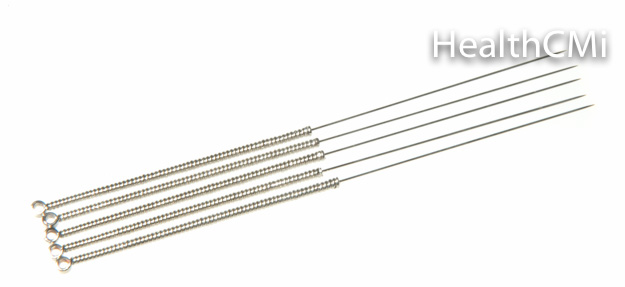Researchers discover anti-inflammatory effects stimulated by acupuncture.
Anti-inflammatory biochemical responses are stimulated by the application of acupuncture. As a result, the body decreases swelling associated with arthritis. In addition, acupuncture prevents postoperative intra-abdominal adhesions. The research is confirmed across several studies including laboratory investigations.

A laboratory study reveals that the anti-inflammatory effects of acupuncture involve the downregulation of proinflammatory cellular biochemicals. In a controlled experiment, rheumatoid arthritis rats were divided into three groups. Group A did not receive medical treatment. Group B received electroacupuncture and group C received prednisolone acetate via intragastric infusion. Prednisolone acetate is a corticosteroid medication. Acupuncture successfully reduced physical inflammation and downregulated proinflammatory biochemicals.
The non-treatment group had elevated levels of proinflammatory biochemicals and significant increases in physical inflammation. The acupuncture and prednisolone acetate groups demonstrated significantly lower levels of proinflammatory biochemicals in the bloodstream in addition to less physical inflammation measured at the ankles. Acupuncture was applied to acupoints Zusanli (ST36) and Kunlun (BL60) for thirty minutes, once per day, for ten days. Let’s take a look at the results.
Acupuncture and prednisolone acetate significantly downregulated serum TNF-α, IL-1β, and ICAM-1 in the rheumatoid arthritis model rats. Measurements taken at the ankles demonstrated significant reductions in swelling determined by the diameter of the ankles. The researchers conclude, “EA [electroacupuncture] intervention is effective in relieving RA [rheumatoid arthritis] rats' inflammatory reactions by down-regulating the levels of serum TNF-α, IL-1β and ICAM-1.”
TNF-α (tumor necrosis factor alpha) is a cell signaling protein active in systemic inflammation. It is a cytokine comprising one of the biochemicals involved in acute phase reactions and is primarily produced by macrophages. TNF-α is implicated in the pathogenesis of severe infectious diseases including cerebral malaria. IL-1β (interleukin 1 beta) is a cytokine that contributes to inflammatory pain hypersensitivity. ICAM-1 (intercellular adhesion molecule 1) is exploited by rhinovirus as a receptor and produces proinflammatory effects including hypersensitivity reactions.

The research of Ouyang et al. is consistent with the biochemical findings demonstrating that acupuncture stimulates an anti-inflammatory biochemical cascade. Ouyang et al. note that electroacupuncture “effectively lower[s] the contents of TNF-α and VEGF in peripheral blood and joint synovia to improve the internal environment for genesis and development of RA [rheumatoid arthritis], so as to enhance the clinical therapeutic effectiveness.” The researchers demonstrated that both manual acupuncture and electroacupuncture significantly reduce both serum and synovial joint levels of TNF-a and vascular endothelial growth factor (VEGF) for human patients with rheumatoid arthritis.
The research of Du et al. is consistent with these findings. Du et al. note that electroacupuncture at acupoint ST36 (Zusanli) “reduced TNF-α and VEGF levels in adhesive tissue homogenates 7 d[ays] after surgery….” In addition, “sham acupuncture had no suppressive effects on TNF-α and VEGF levels.” Du et al. add that electroacupuncture prevents postoperative intra-abdominal adhesions and electroacupuncture at “ST36 alleviated the adhesion formation, with both of macroscopic and histopathologic adhesion scores significantly lower than” the sham acupuncture group.
The research presented here demonstrates the biochemical basis by which acupuncture exerts anti-inflammatory effects. The research indicates that acupuncture is beneficial to patients with rheumatoid arthritis and those recovering from abdominal surgery. Given the scientific evidence, additional research is warranted.
References:
Zhang, R., L. H. Guo, Y. Yin, T. W. Chen, and W. Z. Ma. "Effect of Electroacupuncture on Serum TNF-α, IL-1β and Intercellular adhesion molecule 1 Levels in Rheumatoid Arthritis Rats." Zhen ci yan jiu= Acupuncture research/[Zhongguo yi xue ke xue yuan Yi xue qing bao yan jiu suo bian ji] 41, no. 1 (2016): 51.
McGuire, William, Adrian VS Hill, Catherine EM Allsopp, Brian M. Greenwood, and Dominic Kwiatkowski. "Variation in the TNF-α promoter region associated with susceptibility to cerebral malaria." (1994): 508-511.
Ouyang, Ba-si; Gao, Jie; Che, Jian-li; Zhang, Yin; Li, Jun; Yang, Hai-zhou; Hu, Tian-yan; Yang, Man; Wu, Yuan-jian; Ji, Ling-ling. Effect of electro-acupuncture on tumor necrosis factor-α and vascular endothelial growth factor in peripheral blood and joint synovia of patients with rheumatoid arthritis. Chinese Journal of Integrative Medicine. 2011-07-01. Chinese Association of Traditional and Western Medicine, China Academy of Chinese Medical Sciences. 672-0415, 505- 509 v17 issue 7.
Du, Ming-Hua, Hong-Min Luo, Yi-Jun Tian, Li-Jian Zhang, Zeng-Kai Zhao, Yi Lv, Rui-Jiang Xu, and Sen Hu. "Electroacupuncture ST36 prevents postoperative intra-abdominal adhesions formation." Journal of Surgical Research 195, no. 1 (2015): 89-98.


